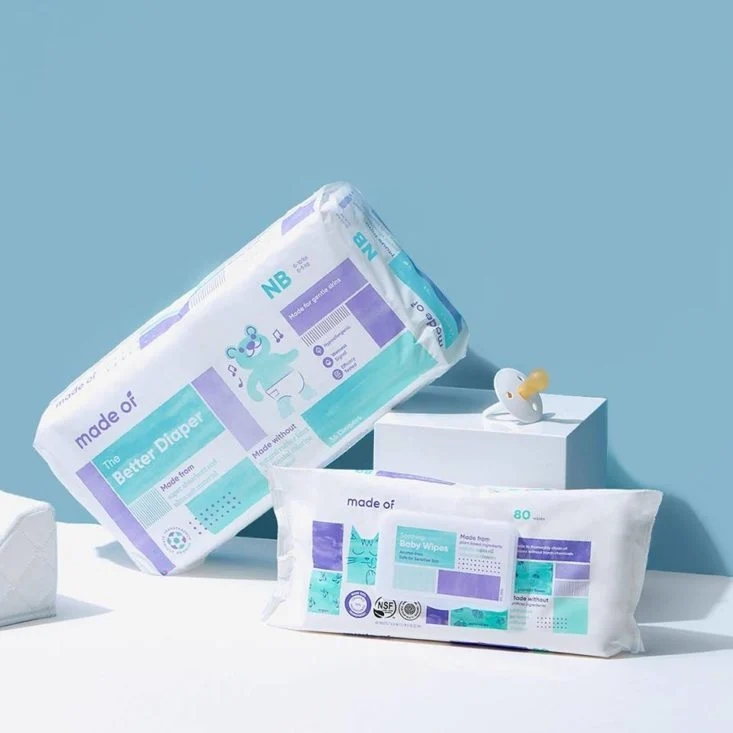Introduction: Why Diaper Material Matters
Your baby’s skin is incredibly delicate, especially during the first few months of life. A baby’s skin is up to 30% thinner than adult skin, making it more vulnerable to irritation, rashes, and allergic reactions. One of the most important decisions parents can make for their child’s comfort and health is choosing the right diaper.
This is where organic diapers for babies come in. Unlike traditional disposable diapers that may contain chlorine, latex, synthetic fragrances, and petroleum-based plastics, organic diapers are made from plant-based, skin-safe materials. These diapers are not only better for your baby’s sensitive skin but also better for the environment.
In this article, we’ll explore why organic diapers are considered the best diapers for sensitive skin, supported by data, expert recommendations, and comparisons to conventional options.
What Makes a Diaper “Organic”?
An organic diaper typically refers to diapers made with:
- Organic cotton or bamboo in the outer layers
- Plant-based absorbent core (e.g., wood pulp)
- No chlorine bleaching
- No harsh chemicals or synthetic fragrances
- Hypoallergenic certifications, such as OEKO-TEX® or Dermatest®
Some popular organic diaper brands include:
- Bambo Nature
- Honest Company
- Seventh Generation
- Andy Pandy
- Dyper
These products aim to provide high absorbency and leak protection without compromising your child’s skin health.
How Conventional Diapers Affect Sensitive Skin
Traditional disposable diapers often contain:
- Chlorine: Used for bleaching, but can create toxic by-products
- Fragrances and lotions: Linked to allergic reactions
- Latex: A known irritant for some babies
- Superabsorbent polymers (SAPs): Effective but synthetic
A 2022 report from the Environmental Working Group (EWG) found that many diaper brands still use ingredients associated with skin irritation, especially for babies prone to diaper rashes or eczema.
Parents often report:
- Redness and irritation within 1–2 hours of use
- Rashes around the legs and waistline
- Dry patches and broken skin due to poor breathability
Benefits of Organic Diapers for Babies
1. Reduced Risk of Diaper Rash
Organic diapers use natural, breathable materials like organic cotton or bamboo that allow for better airflow and less moisture retention. This prevents the buildup of bacteria and yeast, which are major causes of diaper rash.
2. No Harmful Chemicals
By avoiding chlorine bleaching, artificial fragrances, and petroleum-based ingredients, organic diapers lower the risk of:
- Skin irritation
- Allergic reactions
- Long-term skin sensitivity
3. Hypoallergenic Features
Many organic diaper brands are labeled hypoallergenic, meaning they are formulated specifically to minimize allergic responses in sensitive skin diapers.
4. Comfortable Fit and Soft Texture
Organic materials tend to be softer and more flexible, helping your baby move comfortably while reducing chafing.
5. Eco-Friendly Manufacturing
Most organic diaper brands use renewable materials like bamboo or wood pulp, along with biodegradable packaging, making them safer for both your baby and the planet.
Comparing Organic and Conventional Diapers
| Feature | Organic Diapers | Conventional Diapers |
| Chlorine-Free | ✅ | ❌ |
| Fragrance-Free | ✅ | ❌ |
| Hypoallergenic | ✅ | Sometimes |
| Breathable Outer Cover | ✅ | Often plastic-based |
| Moisture-Wicking Core | ✅ Bamboo/Wood Pulp | ✅ SAPs |
| Eco-Friendly Materials | ✅ | ❌ |
| Suitable for Sensitive Skin | ✅ | ❌ |
According to a 2023 Parent Testers Survey, 89% of parents who switched to organic diapers saw a noticeable reduction in skin irritation within the first week.
Key Features to Look for in Organic Diapers
When choosing the best diapers for sensitive skin, look for:
- Organic cotton or bamboo top sheet
- Plant-based absorbent core (wood pulp)
- Wetness indicator (optional but helpful)
- Latex-free and chlorine-free design
- Breathable outer layer
- Elastic waistband for a comfortable fit
Some brands also offer features like:
- Overnight protection
- Compostable packaging
- Subscription models for convenience
The Importance of Breathability and Moisture Control
Moisture is a top cause of diaper rashes and fungal infections. Organic diapers typically offer:
- Better air circulation through natural fabrics
- Faster moisture absorption
- Prevention of bacterial growth
For instance, bamboo-based diapers like Bambo Nature are known for their high moisture-wicking capability and absorbent core design.
Disposable vs. Cloth Organic Diapers
Cloth Diapers
- Reusable and washable
- Made from organic cotton or hemp
- Eco-friendly but require more effort
Disposable Organic Diapers
- Convenient and hygienic
- Ideal for travel or daycare
- Made with plant-based cores and soft outer covers
For sensitive skin, both types can work well, just ensure that they are free from synthetic additives.
Common Ingredients to Avoid
Avoid diapers containing:
- Phthalates (plastic softeners)
- Parabens (preservatives)
- Synthetic dyes
- Fragrance and lotion additives
Arsahd Baby’s future line of organic diapers for babies could tap into this market by offering their own hypoallergenic, breathable, and ultra-soft options.
Tips for Parents Switching to Organic Diapers
- Try a small pack first to test fit and comfort
- Combine with organic baby wipes for full skin safety
- Choose diapers with a wetness indicator to avoid overuse
- Use fragrance-free diaper creams if needed
- Keep a diaper log if your child has recurring rashes
According to the Mayo Clinic, diaper rash affects over 50% of babies during their first year, and many of which can be prevented with the right diaper choice.
The Safer, Smarter Diaper Choice
Choosing organic diapers for babies is not just a trend—it’s a science-backed solution for promoting better skin health, comfort, and safety. With fewer harmful chemicals, higher breathability, and better moisture control, these diapers truly are the best diapers for sensitive skin.
By investing in quality organic diapers, you’re protecting your baby’s skin while also making a responsible choice for the planet.
If you’re a parent seeking comfort, cleanliness, and confidence in every diaper change, make the organic choice; your baby’s skin will thank you.


